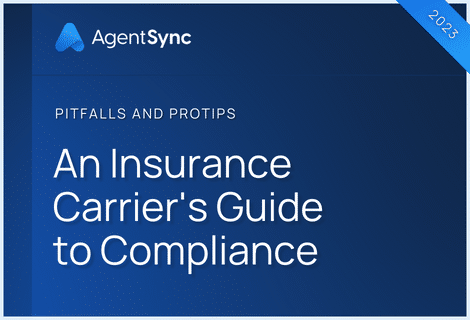

Anyone in insurance is used to the hodgepodge of varied insurance regulations, complicated by the state of origin, state of sale, line of business, and carrier preference. Some of it can’t be helped – insurance is highly regulated for a reason, and states don’t seem inclined to cede that power anytime soon. Yet, we’ve covered before the possible things carriers could do to make the industry easier on themselves and the producers who sell their products.
Many process changes that could make it easier to work across the industry have to do with paperwork – using the same forms, standardizing the way carriers gather information from producers, and eliminating repetitive, unnecessary steps.
Today, let’s talk about one of the most repetitive, unnecessary steps that too many carriers still use as part of their standard onboarding process: a copy of the producer’s license.
Getting your license copy
To get licensed, a producer must have passed the state exam or, if they have been licensed for a few years, be up-to-date on continuing education credits, and have completed any renewal process that is in place.
Yet, there is no graduation ceremony, no presentation of a producer license like a diploma. Instead, if a producer wants one, they can ask the state to provide a license they can print, or some states print and mail them.
A copy of the state license can be useful in terms of knowing when it will expire, and what, exactly, a state has licensed you for. But its usefulness is somewhat similar to your diploma. Other than hanging it on a wall, it doesn’t serve much practical purpose. If someone needs to verify that you have a degree, they’re ultimately going to go to the source and request records from your school. Similarly, entities that are serious about verifying producer license information are going to be using the National Insurance Producer Registry’s database as a source of truth.
What does it cost to have my insurance license printed?
Most states, through vendor websites or their own, will allow you to download and/or print licenses for free as long as you’re within 30 days of obtaining or renewing the license. Other than that, there’s some variation between the states as far as the procedure and cost of getting a printed license.
SBS downloads to print insurance license
States that use the State Based Systems tool from NAIC don’t charge anything for a producer to download and print their licenses.
These are:
- Alabama
- Alaska
- Arkansas
- Arizona
- Connecticut
- Delaware
- District of Columbia
- Illinois
- Iowa
- Kansas
- Maryland
- Missouri
- Montana
- Nebraska
- New Hampshire
- New Jersey
- New Mexico
- North Carolina
- North Dakota
- Oklahoma
- Oregon
- Puerto Rico
- Rhode Island
- South Carolina
- Tennessee
- Virgin Islands
- Vermont
- West Virginia
- Wisconsin
Private vendor printing for an insurance license
Other states have a private vendor that manages many of their license services. For individuals who need to download or print their license in the following states, the vendor will charge a service fee:
- California
- Colorado
- Georgia
- Idaho
- Indiana
- Minnesota
- Mississippi
- Nevada
- South Dakota
- Texas
- Utah
- Virginia
- Wyoming
Individual state services to print insurance license
California and Florida work with a vendor that charges a service fee, but also run state websites that allow producers to print their licenses without service charges. Still other states exclusively allow printing through their own state-run websites:
- Hawaii
- Idaho
- Kentucky
- Louisiana
- Maine
- Massachusetts
- Michigan
- New York
- Ohio
- Pennsylvania
- Washington
While most states don’t charge for a license download outside of a possible service fee if they are with a private vendor, there are some nuances (because of course there are, what are you new here?). For instance, to get a copy of your license in Michigan, you don’t fill in an application, you actually send an email to make your request. Additionally, while Maine allows you to request a PDF or a printed license, Massachusetts will only deliver a physical copy of your license, and for $25 no less. New York charges $15 for services, and Mississippi charges $25 for duplicates.
National Insurance Producer Registry (NIPR) has a handy tool on its website, originally from the NAIC, which allows you to pick a state from the dropdown list and directs you to the best site for the license printing.
Why carriers should eliminate the paper license requirement
If you’re licensed as a producer in multiple states and a new carrier requires you to submit digital copies of each license, good luck. Maybe you got a copy of each when you were first approved by the state or when you renewed your license, in which case you just need to get all the records and upload. But if you’re missing some, you’ll need to track them down. Not only is this costing you time, it’s costing you money if you’re past those first 30 days of licensure.
Aside from just the obvious “being easier to work with by not requiring producers to jump through unnecessary hoops,” let’s be clear about how unnecessary those hoops are.
For one thing, having a copy of the license doesn’t tell you if this information is up-to-date. There are a number of ways (some covered here) a producer can lose their license. That’s not to mention the unlikely-but-not-out-of-the-question possibility that someone falsifies a document. After all, uploading or sending in copies often involves a copy of a copy of a copy.
Carriers generally already realize this and use some alternative method for verifying producer licenses. Typically, this is through something like the NIPR producer database (PDB). Either by manually plugging in a producer’s national producer number or by automatically syncing with the PDB with a tool like AgentSync Manage, carriers have all the necessary information about state licenses, lines of authority, other appointments, and expiration dates. Less hassle for the producer, and quality, truthful data.
If a carrier is using the NIPR PDB, why continue to ask for paper copies of a license? If it doesn’t ensure accuracy or compliance, and it complicates (and lengthens!) the onboarding process for producers, we truly can’t think of an answer.
If you’re ready to be sure about compliance and ditch the unnecessary paperwork, sign up for a demo today.

